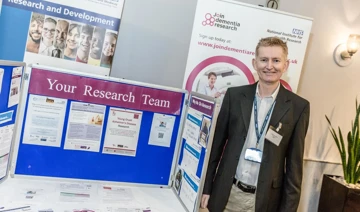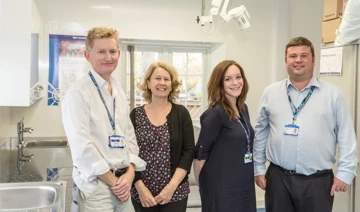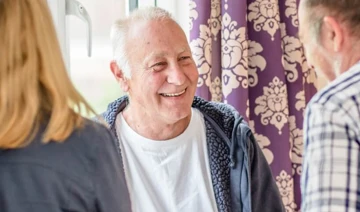Dementia Studies
Get involved
If you would like to take part in any of the studies, below, or would like further information, please contact a member of the team. Alternatively you con complete our online form
You can also register with the national online database, Join Dementia Research (JDR). It is a place for people to register their interest in participating in dementia research. It helps people with dementia, their carers and/or anyone interested in dementia research to be matched to potentially-suitable studies.
Twitter: @beatdementia
Studies
'Join dementia research' is a national service that enables you to register your interest and be matched with suitable research studies. The service is aimed at people with dementia and their carers, but anyone with and without dementia over the age of 18 can sign up and people can register on behalf of someone else.
Why is dementia research important now?
Dementia is one of the biggest challenges we face today. The number of people with Alzheimer's disease, vascular dementia, and other types of dementia, is set to double over the next 30 years. Research offers hope. It is only through research that we can understand what causes the disease, develop effective treatments, improve care and hopefully one day find a cure.
But for research to progress we need more people to take part in more studies. Our knowledge of dementia currently lags behind that of other major conditions, such as cancer or heart disease. We have to close this gap.
Principal Investigator: Dr Catherine (Karen) Anosike
Problem Adaptation Therapy for individuals with mild to moderate dementia and depression.
This study will investigate whether an adapted form of problem-solving therapy called Problem Adaptation Therapy (PATH), which has been reported to be helpful in the very early stages of dementia in an American university-based healthcare system, can be successfully applied in an NHS setting with patients who are representative of those seen with dementia and depression in the NHS.
Those who are eligible and agree to participate would be randomised to receive PATH therapy plus routine care or routine care alone. There is a 50% chance that participants will be offered eight, one-hour sessions of Problem Adaptation Therapy over three months. The therapy will consist of 2 assessment sessions, 5 sessions focused on problem solving, and 1 review session. The therapy sessions are delivered to the person with dementia and the caregiver. There will also be two additional 1-hour ‘booster’ sessions, three months and six months later which will “top up” any potential benefits from the initial therapy by reviewing the problem-solving strategies used earlier. These sessions are can be provided remotely or face-to-face.
The study is in follow up and currently closed to recruitment.
For referrals and further information please contact Senior Clinical Research Practitioner: Jamie.harper@nhs.net
Principal Investigator: Dr Joanne Rodda
This study will investigate the effectiveness of a psychological intervention involving strategies for achieving individually tailored goals relating to independence at home.
People living with dementia (of any sub-type or severity) will take part with their family carer/s and those who are eligible and agree to participate will be randomised to receive the NIDUS-family intervention plus routine care or routine care alone.
The NIDUS-family intervention involves eight sessions over a six month period with an additional three month period of fortnightly to monthly telephone follow-ups. Sessions can be delivered remotely or face-to-face.
This study is currently closed to recruitment.
For referrals and further information please contact Senior Clinical Research Practitioner and Occupational Therapist: myles.howard@nhs.net
Principal Investigator: Dr Brett Metelerkamp
This study will test the performance and reliability of a new cognitive test. The new test is called the Integrated Cognitive Assessment (ICA) and it is a computerized, artificial intelligence assisted cognitive assessment test. It has been developed to assist healthcare professionals in the screening, diagnosis and monitoring of diseases associated with cognitive impairment, including Alzheimer’s disease.
Men and women aged 55 to 90 years old, who have a diagnosis of: Alzheimer’s disease, mild cognitive impairment or who have no diagnosis (healthy controls) will be invited to participate.
Participation involves one research interview (with an optional one-off follow-up), where participants will answer questionnaires with a clinical research practitioner and will use a hand held computer to complete the Integrated Cognitive Assessment.
This study is currently closed to recruitment.
For referrals and further information please contact Senior Clinical Research Practitioner: Jamie.harper@nhs.net
Principal Investigator: Dr Joanne Rodda
This study will investigate the effectiveness of a group intervention which supports participants to develop personalised plans to achieve behavior change targets. Targets may focus on nutrition, drinking, smoking, physical activity, mental wellbeing and reducing social isolation and participants may be supported to engage with external services or groups where appropriate.
People aged 60 and above who have a diagnosis of mild cognitive impairment or subjective cognitive decline will be invited to participate with a relative, friend or professional with whom they are in at least monthly contact.
This study is currently closed to recruitment but may recruit again in future.
For referrals and further information please contact Senior Clinical Research Practitioner and Occupational Therapist: myles.howard@nhs.net or
Senior Clinical Research Practitioner: Jamie.harper@nhs.net
Local Collaborator: Dr Joanne Rodda
The aim of this study is to understand inequalities in dementia care and explore what drives good and bad quality of life, outcomes and costs for people with dementia and their carers following diagnosis.
Nine hundred people with dementia (any sub-type or severity) and their carers (if applicable) will be invited to take part in this study in the 6 months following their diagnosis. Participants will be followed up for three years in order to collect information on service use and outcomes including quality of life.
This study is OPEN for referrals.
For referrals and further information please contact Senior Clinical Research Practitioner: Jamie.harper@nhs.net
Principal Investigator: Dr Kompancariel Kuruvilla
Human tissue is vital for dementia research but in the past was in short supply and is not covered in standard organ donation schemes. With the support of Alzheimer’s Society and Alzheimer’s Research UK, Brains for Dementia Research was set up in 2007 to establish a network of brain bank facilities across England and Wales.
It is now a ‘gold standard’ for brain tissue banking, linking five leading brain banks (based in London, Oxford, Newcastle, Bristol and Manchester) and a research Centre in Cardiff in a network of common standards, best practice and cooperation. This lays the foundation to enable the highest quality dementia research, which aims to find effective treatments for dementia.
In Kent, people with mild cognitive impairment or a diagnosis of dementia, and healthy participants, were supported to register for brain donation by the research team.
This is a unique initiative, as the memory, thinking and behavior of each prospective donor are monitored throughout their later life through regular assessments. This means that when the time comes for the donation to be made, researchers also have a detailed medical history and can see how brain changes correlate with symptoms. The Kent participants complete these assessments yearly.
The study is in follow up and closed to recruitment.
For further information please contact Senior Research Nurse: alison.welfare-wilson@nhs.net
Principal Investigator: Dr Oladapo Babatola
This public technology perception survey can be completed by anyone (staff, service users, carers and their families/friends) over the age of 18.
The data collected in this public survey aims to explore perceptions and understandings ofassistive technology and medical devices, the results of which will inform an important aspect of a much larger research project called MINDER. The follow-on study to TIHM – Integrated Healthcare Management. https://www.sabp.nhs.uk/TIHM
Online link for the survey: Please remember to select ‘Kent & Medway NHS’ when completing the survey, to ensure KMPT are recognised for their contribution to this piece of research.
https://survey.fra1.qualtrics.com/jfe/form/SV_2coFYpkujtVVFyJ
For further information please contact Senior Clinical Research Practitioner and Occupational Therapist: myles.howard@nhs.net






